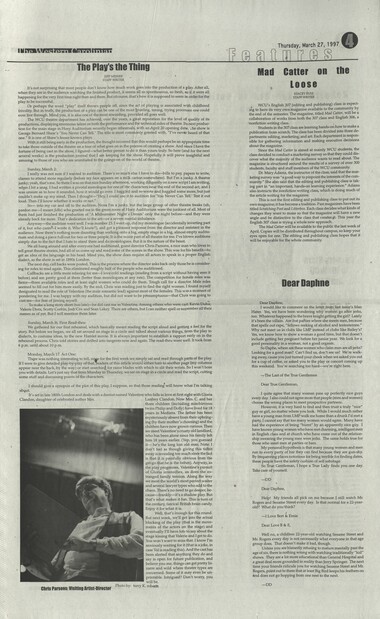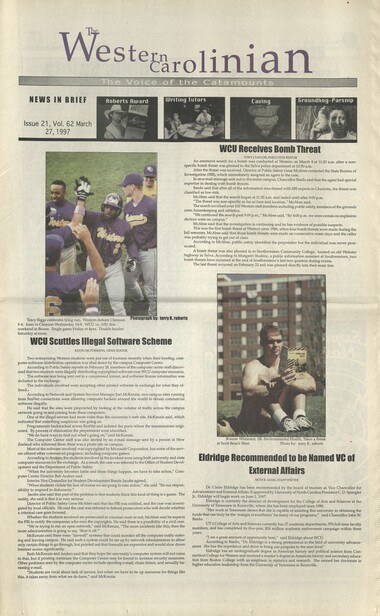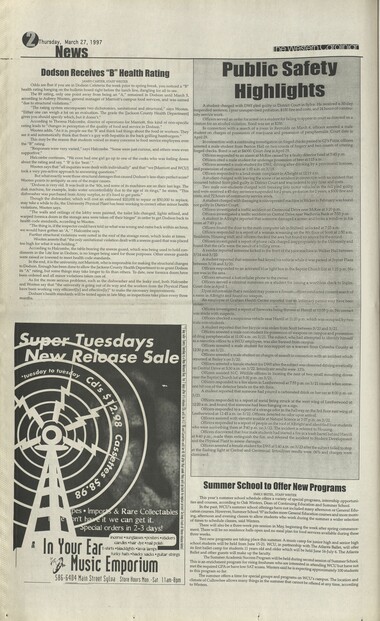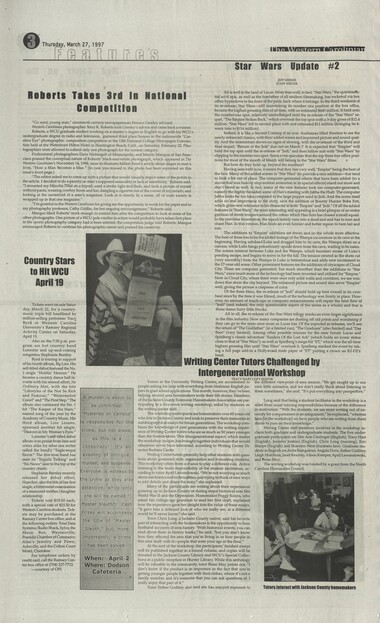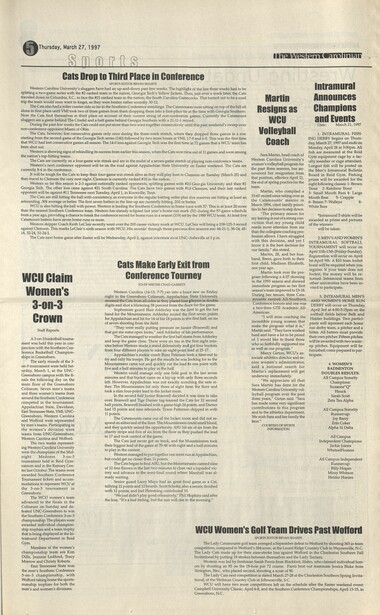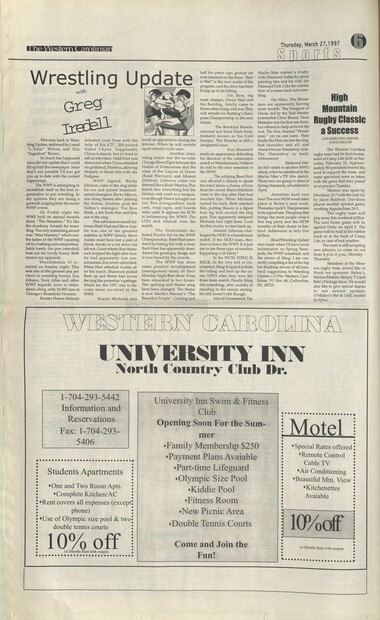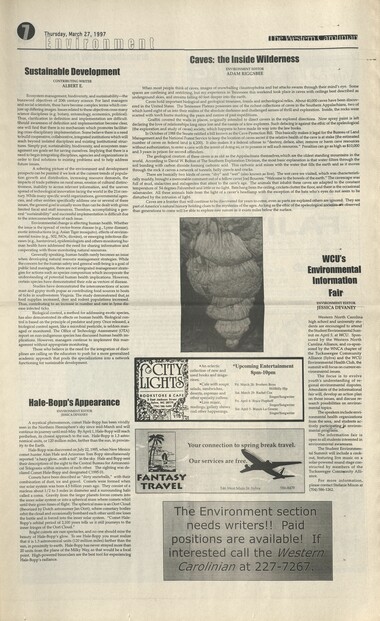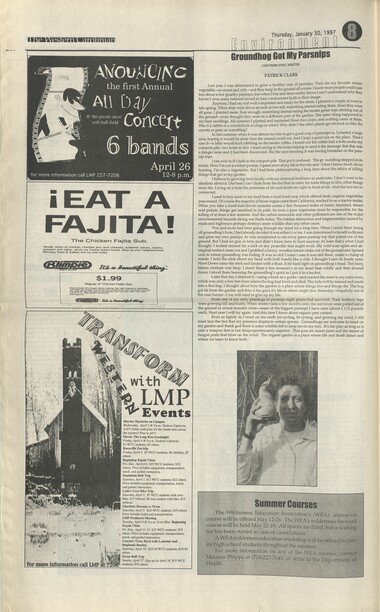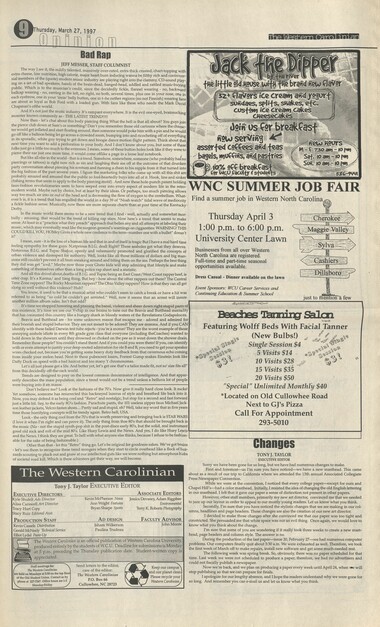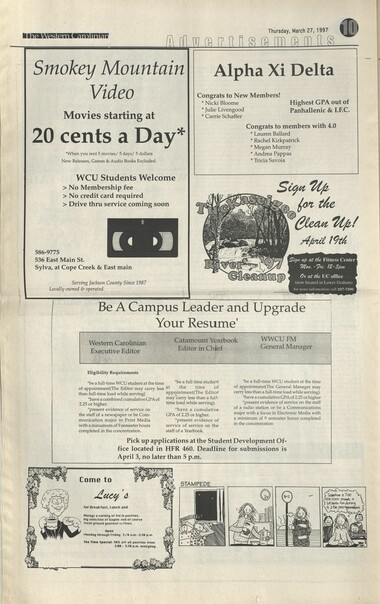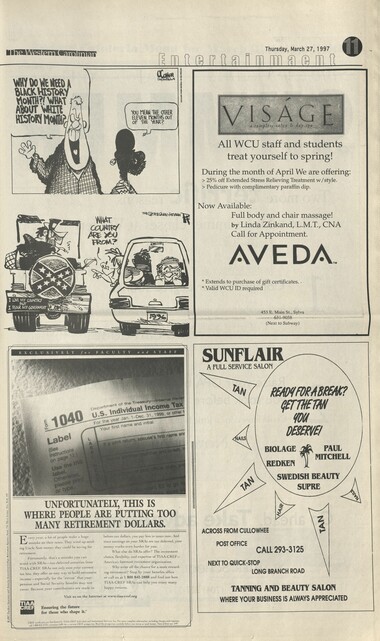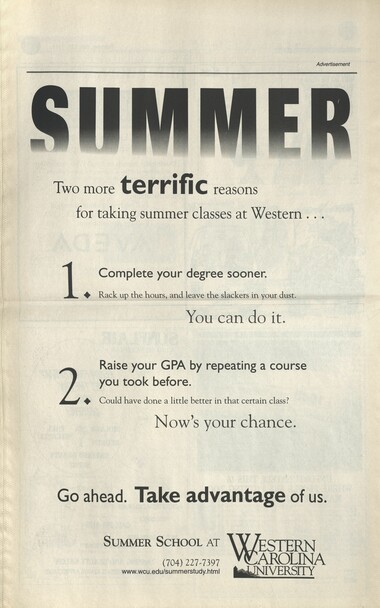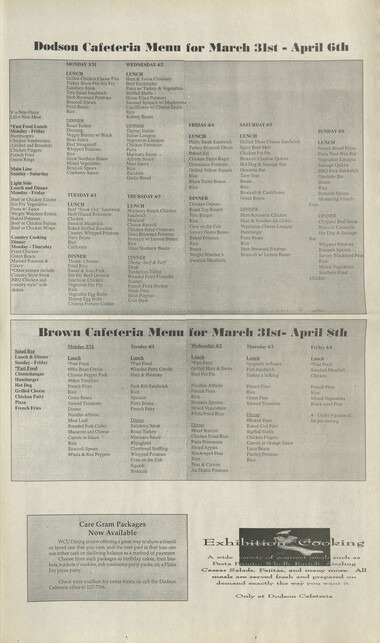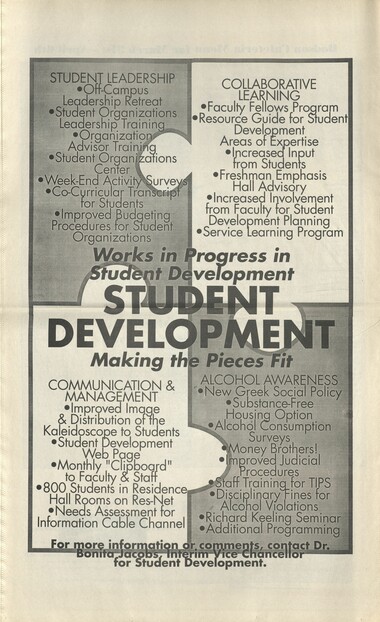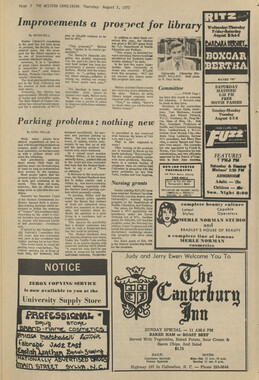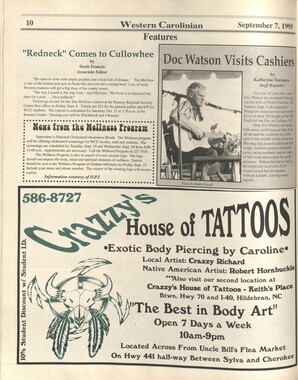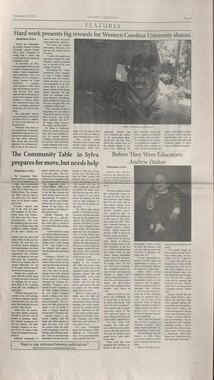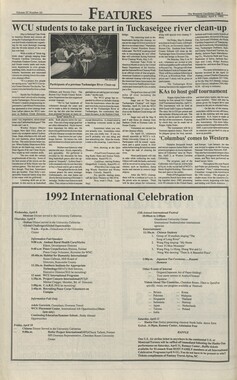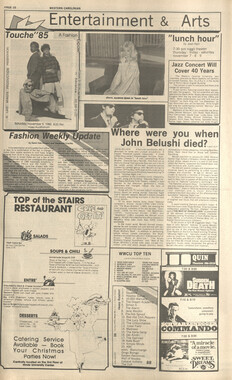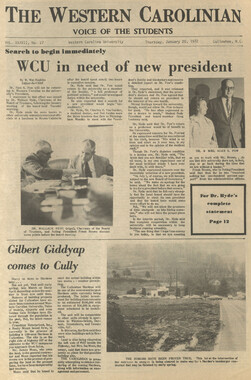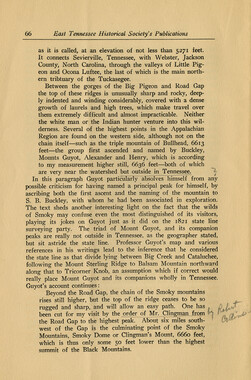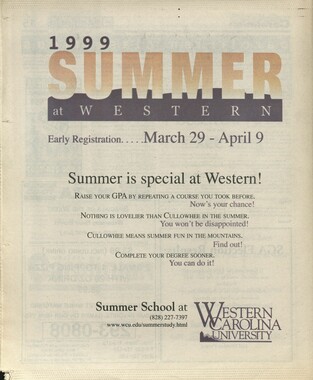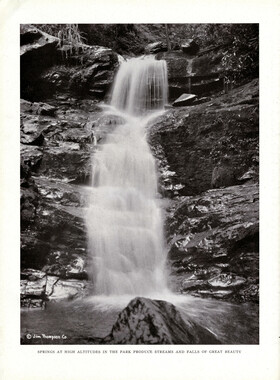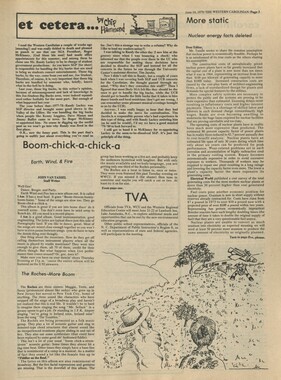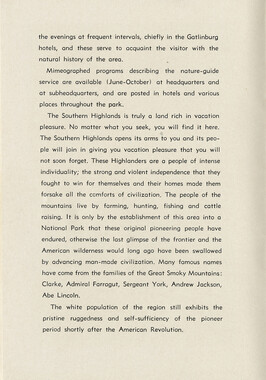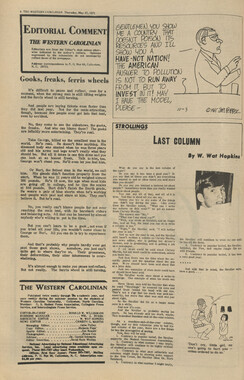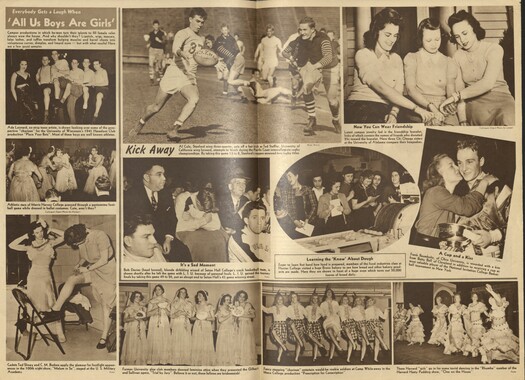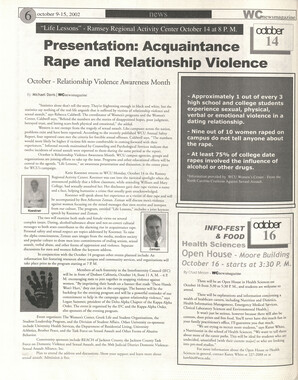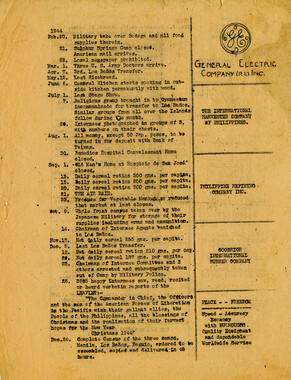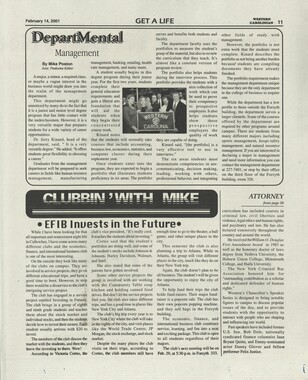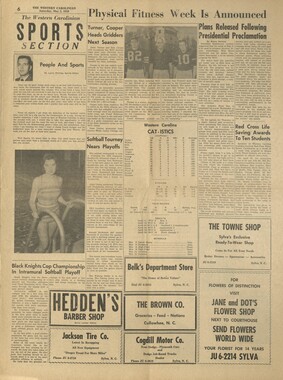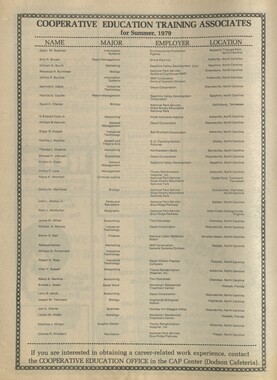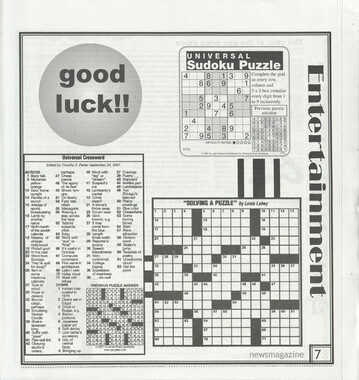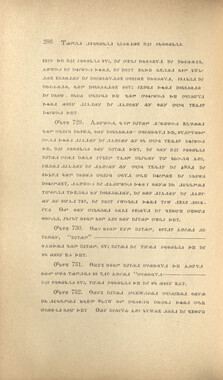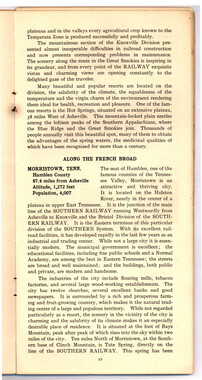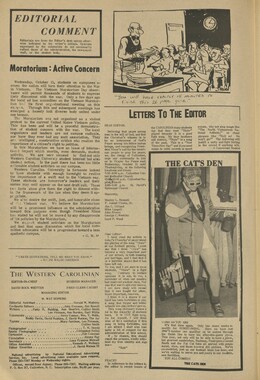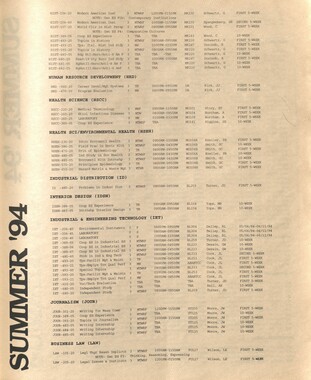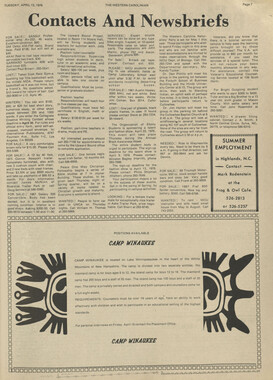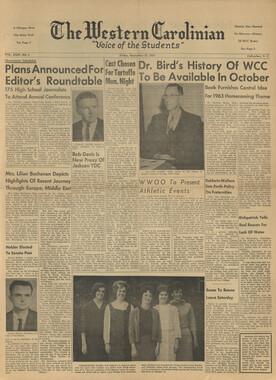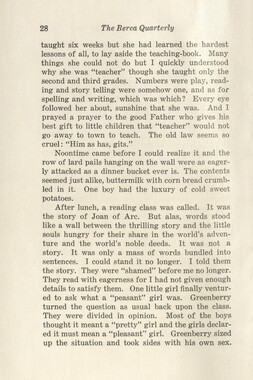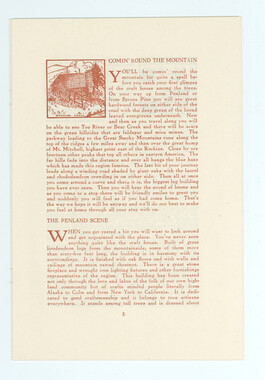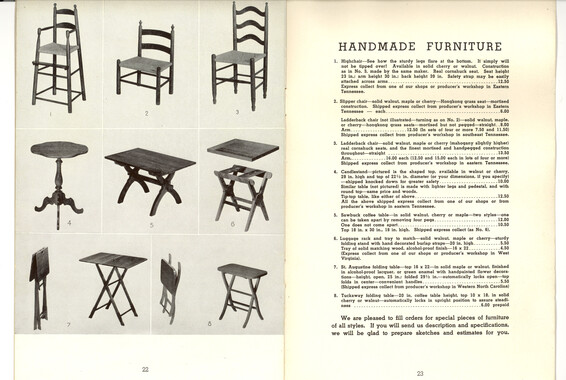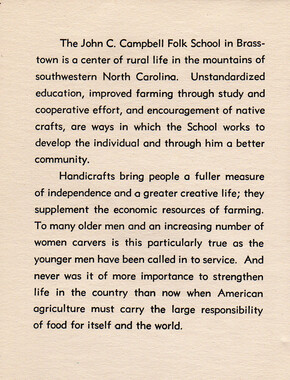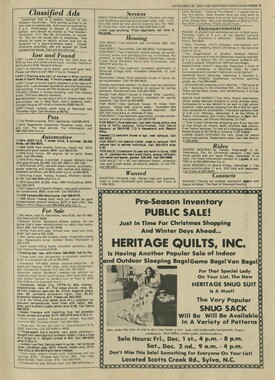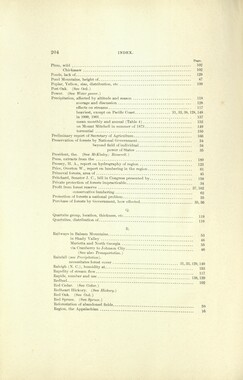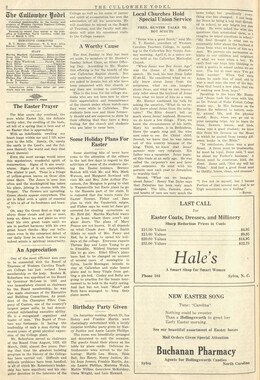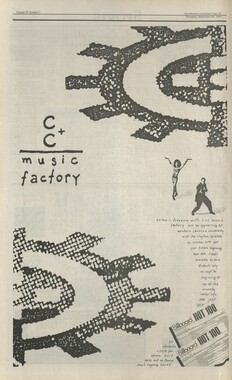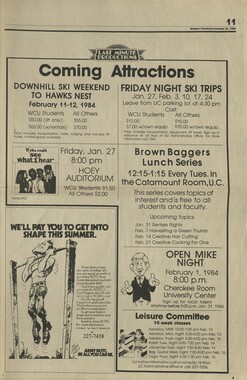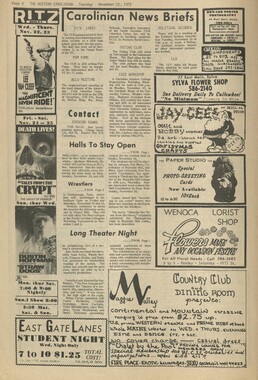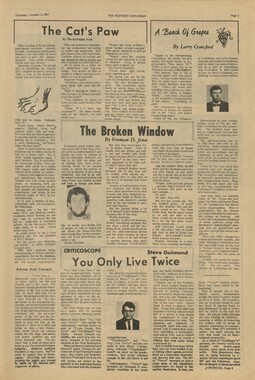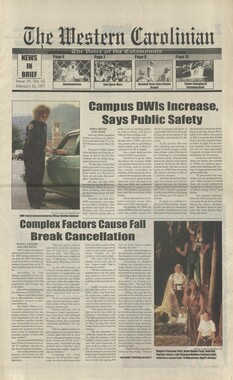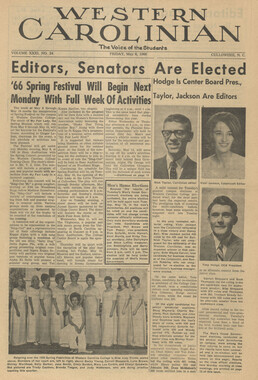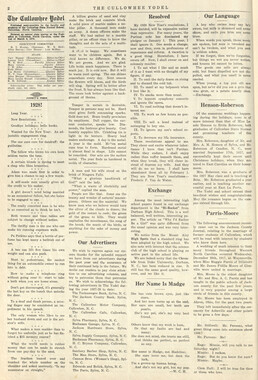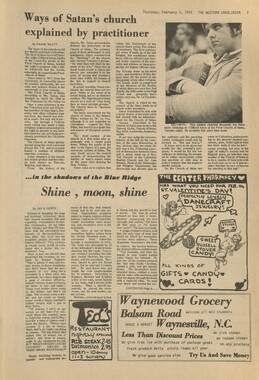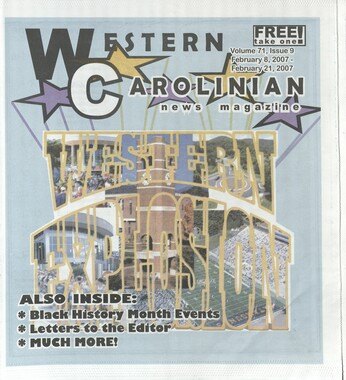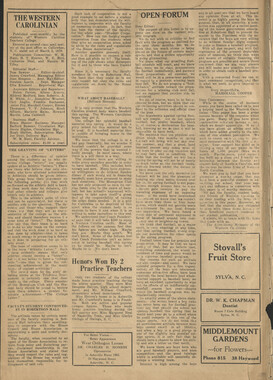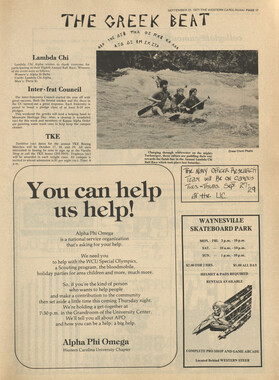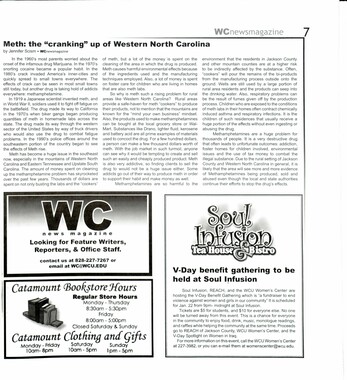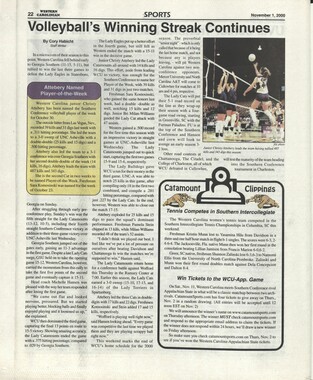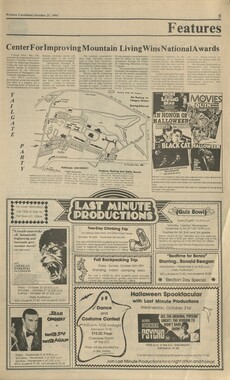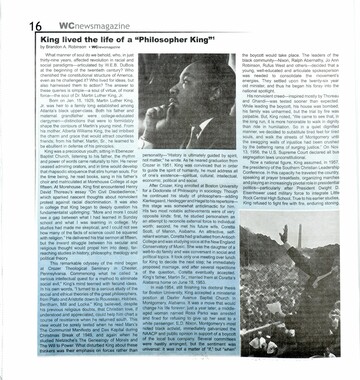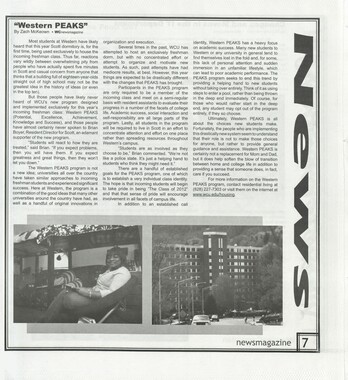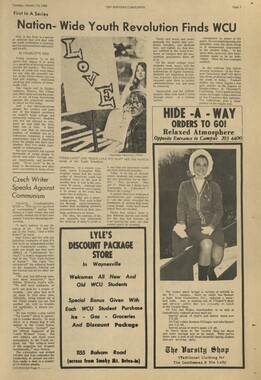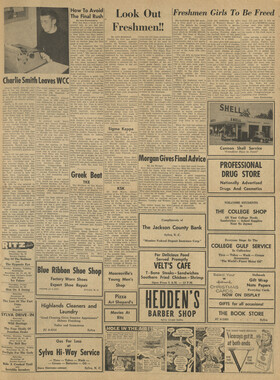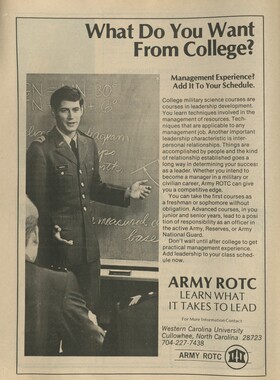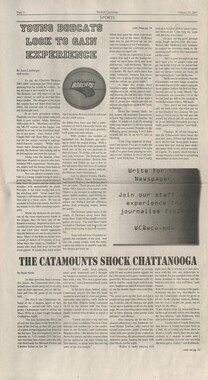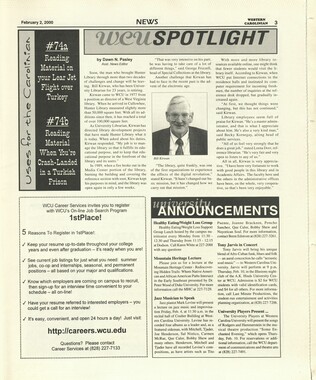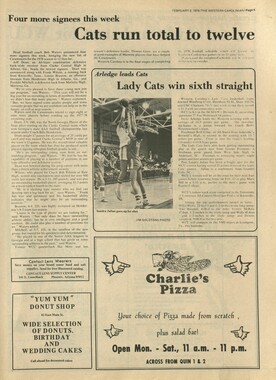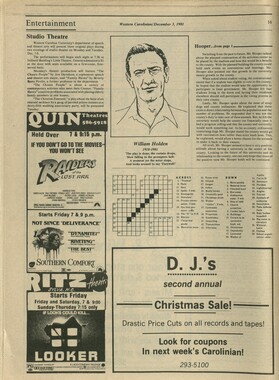Western Carolina University (20)
View all
- Canton Champion Fibre Company (2308)
- Cherokee Traditions (291)
- Civil War in Southern Appalachia (165)
- Craft Revival (1942)
- Great Smoky Mountains - A Park for America (2946)
- Highlights from Western Carolina University (430)
- Horace Kephart (941)
- Journeys Through Jackson (159)
- LGBTQIA+ Archive of Jackson County (85)
- Oral Histories of Western North Carolina (314)
- Picturing Appalachia (6798)
- Stories of Mountain Folk (413)
- Travel Western North Carolina (160)
- Western Carolina University Fine Art Museum Vitreograph Collection (129)
- Western Carolina University Herbarium (92)
- Western Carolina University: Making Memories (708)
- Western Carolina University Publications (2412)
- Western Carolina University Restricted Electronic Theses and Dissertations (146)
- Western North Carolina Regional Maps (71)
- World War II in Southern Appalachia (131)
University of North Carolina Asheville (6)
View all
- Allanstand Cottage Industries (62)
- Appalachian National Park Association (53)
- Bennett, Kelly, 1890-1974 (1388)
- Berry, Walter (76)
- Brasstown Carvers (40)
- Carver, George Washington, 1864?-1943 (26)
- Cathey, Joseph, 1803-1874 (1)
- Champion Fibre Company (233)
- Champion Paper and Fibre Company (297)
- Cherokee Indian Fair Association (16)
- Cherokee Language Program (22)
- Crowe, Amanda (40)
- Edmonston, Thomas Benton, 1842-1907 (7)
- Ensley, A. L. (Abraham Lincoln), 1865-1948 (275)
- Fromer, Irving Rhodes, 1913-1994 (70)
- George Butz (BFS 1907) (46)
- Goodrich, Frances Louisa (120)
- Grant, George Alexander, 1891-1964 (96)
- Heard, Marian Gladys (60)
- Kephart, Calvin, 1883-1969 (15)
- Kephart, Horace, 1862-1931 (313)
- Kephart, Laura, 1862-1954 (39)
- Laney, Gideon Thomas, 1889-1976 (439)
- Masa, George, 1881-1933 (61)
- McElhinney, William Julian, 1896-1953 (44)
- Niggli, Josephina, 1910-1983 (10)
- North Carolina Park Commission (105)
- Osborne, Kezia Stradley (9)
- Owens, Samuel Robert, 1918-1995 (11)
- Penland Weavers and Potters (36)
- Roberts, Vivienne (15)
- Roth, Albert, 1890-1974 (142)
- Schenck, Carl Alwin, 1868-1955 (1)
- Sherrill's Photography Studio (2565)
- Southern Highland Handicraft Guild (127)
- Southern Highlanders, Inc. (71)
- Stalcup, Jesse Bryson (46)
- Stearns, I. K. (213)
- Thompson, James Edward, 1880-1976 (226)
- United States. Indian Arts and Crafts Board (130)
- USFS (683)
- Vance, Zebulon Baird, 1830-1894 (1)
- Weaver, Zebulon, 1872-1948 (58)
- Western Carolina College (230)
- Western Carolina Teachers College (282)
- Western Carolina University (1899)
- Western Carolina University. Mountain Heritage Center (18)
- Whitman, Walt, 1819-1892 (10)
- Wilburn, Hiram Coleman, 1880-1967 (73)
- Williams, Isadora (3)
- Cain, Doreyl Ammons (0)
- Crittenden, Lorraine (0)
- Rhodes, Judy (0)
- Smith, Edward Clark (0)
- Appalachian Region, Southern (2569)
- Asheville (N.C.) (1923)
- Avery County (N.C.) (26)
- Blount County (Tenn.) (195)
- Buncombe County (N.C.) (1672)
- Cherokee County (N.C.) (283)
- Clay County (N.C.) (555)
- Graham County (N.C.) (233)
- Great Smoky Mountains National Park (N.C. and Tenn.) (519)
- Haywood County (N.C.) (3569)
- Henderson County (N.C.) (70)
- Jackson County (N.C.) (4804)
- Knox County (Tenn.) (35)
- Knoxville (Tenn.) (13)
- Lake Santeetlah (N.C.) (10)
- Macon County (N.C.) (420)
- Madison County (N.C.) (215)
- McDowell County (N.C.) (39)
- Mitchell County (N.C.) (132)
- Polk County (N.C.) (35)
- Qualla Boundary (981)
- Rutherford County (N.C.) (76)
- Swain County (N.C.) (2135)
- Transylvania County (N.C.) (270)
- Watauga County (N.C.) (12)
- Waynesville (N.C.) (86)
- Yancey County (N.C.) (72)
- Aerial Photographs (3)
- Aerial Views (60)
- Albums (books) (4)
- Articles (1)
- Artifacts (object Genre) (228)
- Bibliographies (1)
- Biography (general Genre) (2)
- Cards (information Artifacts) (38)
- Clippings (information Artifacts) (191)
- Copybooks (instructional Materials) (3)
- Crafts (art Genres) (622)
- Depictions (visual Works) (21)
- Design Drawings (1)
- Drawings (visual Works) (185)
- Envelopes (73)
- Exhibitions (events) (1)
- Facsimiles (reproductions) (1)
- Fiction (general Genre) (4)
- Financial Records (12)
- Fliers (printed Matter) (67)
- Glass Plate Negatives (381)
- Guidebooks (2)
- Internegatives (10)
- Interviews (815)
- Land Surveys (102)
- Letters (correspondence) (1013)
- Manuscripts (documents) (618)
- Maps (documents) (177)
- Memorandums (25)
- Minutes (administrative Records) (59)
- Negatives (photographs) (6015)
- Newsletters (1290)
- Newspapers (2)
- Notebooks (8)
- Occupation Currency (1)
- Paintings (visual Works) (1)
- Pen And Ink Drawings (1)
- Periodicals (193)
- Personal Narratives (10)
- Photographs (12976)
- Plans (maps) (1)
- Poetry (5)
- Portraits (4539)
- Postcards (329)
- Programs (documents) (151)
- Publications (documents) (2364)
- Questionnaires (65)
- Relief Prints (26)
- Sayings (literary Genre) (1)
- Scrapbooks (282)
- Sheet Music (2)
- Slides (photographs) (402)
- Songs (musical Compositions) (2)
- Sound Recordings (796)
- Specimens (92)
- Speeches (documents) (15)
- Tintypes (photographs) (8)
- Transcripts (322)
- Video Recordings (physical Artifacts) (23)
- Text Messages (0)
- A.L. Ensley Collection (275)
- Appalachian Industrial School Records (7)
- Appalachian National Park Association Records (336)
- Axley-Meroney Collection (2)
- Bayard Wootten Photograph Collection (20)
- Bethel Rural Community Organization Collection (7)
- Blumer Collection (5)
- C.W. Slagle Collection (20)
- Canton Area Historical Museum (2110)
- Carlos C. Campbell Collection (462)
- Cataloochee History Project (64)
- Cherokee Studies Collection (4)
- Daisy Dame Photograph Album (5)
- Daniel Boone VI Collection (1)
- Doris Ulmann Photograph Collection (112)
- Elizabeth H. Lasley Collection (1)
- Elizabeth Woolworth Szold Fleharty Collection (4)
- Frank Fry Collection (95)
- George Masa Collection (173)
- Gideon Laney Collection (452)
- Hazel Scarborough Collection (2)
- Hiram C. Wilburn Papers (28)
- Historic Photographs Collection (236)
- Horace Kephart Collection (861)
- Humbard Collection (33)
- Hunter and Weaver Families Collection (1)
- I. D. Blumenthal Collection (4)
- Isadora Williams Collection (4)
- Jesse Bryson Stalcup Collection (47)
- Jim Thompson Collection (224)
- John B. Battle Collection (7)
- John C. Campbell Folk School Records (80)
- John Parris Collection (6)
- Judaculla Rock project (2)
- Kelly Bennett Collection (1407)
- Love Family Papers (11)
- Major Wiley Parris Civil War Letters (3)
- Map Collection (12)
- McFee-Misemer Civil War Letters (34)
- Mountain Heritage Center Collection (4)
- Norburn - Robertson - Thomson Families Collection (44)
- Pauline Hood Collection (7)
- Pre-Guild Collection (2)
- Qualla Arts and Crafts Mutual Collection (12)
- R.A. Romanes Collection (681)
- Rosser H. Taylor Collection (1)
- Samuel Robert Owens Collection (94)
- Sara Madison Collection (144)
- Sherrill Studio Photo Collection (2558)
- Smoky Mountains Hiking Club Collection (616)
- Stories of Mountain Folk - Radio Programs (374)
- The Reporter, Western Carolina University (510)
- Venoy and Elizabeth Reed Collection (16)
- WCU Gender and Sexuality Oral History Project (32)
- WCU Mountain Heritage Center Oral Histories (25)
- WCU Oral History Collection - Mountain People, Mountain Lives (71)
- WCU Students Newspapers Collection (1843)
- Western North Carolina Tomorrow Black Oral History Project (69)
- William Williams Stringfield Collection (2)
- Zebulon Weaver Collection (109)
- African Americans (390)
- Appalachian Trail (35)
- Artisans (521)
- Cherokee art (84)
- Cherokee artists -- North Carolina (10)
- Cherokee language (21)
- Cherokee pottery (101)
- Cherokee women (208)
- Church buildings (172)
- Civilian Conservation Corps (U.S.) (111)
- College student newspapers and periodicals (1933)
- Dams (107)
- Dance (1023)
- Education (222)
- Floods (61)
- Folk music (1015)
- Forced removal, 1813-1903 (2)
- Forest conservation (220)
- Forests and forestry (1184)
- Gender nonconformity (4)
- Great Smoky Mountains National Park (N.C. and Tenn.) (181)
- Hunting (45)
- Landscape photography (25)
- Logging (119)
- Maps (83)
- Mines and mineral resources (8)
- North Carolina -- Maps (18)
- Paper industry (38)
- Postcards (255)
- Pottery (135)
- Railroad trains (72)
- Rural electrification -- North Carolina, Western (3)
- School integration -- Southern States (2)
- Segregation -- North Carolina, Western (5)
- Slavery (5)
- Sports (452)
- Storytelling (243)
- Waterfalls -- Great Smoky Mountains (N.C. and Tenn.) (66)
- Weaving -- Appalachian Region, Southern (280)
- Wood-carving -- Appalachian Region, Southern (328)
- World War, 1939-1945 (173)
Western Carolinian Volume 62 Number 21
Item
Item’s are ‘child’ level descriptions to ‘parent’ objects, (e.g. one page of a whole book).
-
-
IN ST£VaV/S3 7337V ART7S1 lL*ll*la The Play's the Thing JEFFMESSER „ • STAFF WRITER It's not surprising that most people don't know how much work goes into the production of a play. After all, when they are in the audience watching the finished product, it seems all so spontaneous, so fresh, as if it were all happening for the very first time right then and there. But ofcourse, that's how it is supposed to seem in order for the play to be successful. Or perhaps the word "play" itself throws people off, since the act of playing is associated with childhood frivolity. But in truth, the production of a play can be one of the most grueling, taxing, trying processes one could ever live through. Mind you, it is also one of the most rewarding, provided all goes well. The WCU theatre department has achieved, over the years, a great reputation for the level of quality of its productions, displaying enormous talent on both the performance and the technical sides of theatre. Its next production for the main stage in Hoey Auditorium recently began rehearsals, with an April 20 opening date. Yhe show is George Bernard Shaw's "You Never Can Tell." The title is most commonly greeted with, "I've never heard of that one." It is one of Shaw's lesser-known plays. With it still being early in the production, the thought occurred that this would perhaps be an appropriate time to take those outside of the theatre on a tour of what goes on in the process of creating a show. And since I have the fortune of being cast in the show, I figured—what better person to do it than yours truly. So here (and for the next several weeks) is the production journal that I am keeping for the show. Hopefully it will prove insightful and amusing to those of you who are uninitiated to the goings-on of the world of theatre. Sunday, March 2: I really was not sure if I wanted to audition. There's so much else I have to do—bills to pay, papers to write, classes to attend more regularly (before my face appears on a milk carton somewhere). But I'm a junky. A theatre junky; yeah, that's me. So there I was on that nice Sunday afternoon, working diligently on a new script I am writing, when I hit a snag. I had written a pivotal monologue for one of the characters near the end of the second act, and I was unsure as to how it sounded, how it would go over. I haggled and re-wrote and haggled some more, but just couldn't make up my mind. Then I thought—"Hey, I could use it to audition for 'You Never Can Tell.' Test it out loud. Then I'll know whether it works or not." So— into my car and off to the audition. Nowj I'm a junky, but the large group of other theatre freaks (uh, pardon me—I meant folks) who greeted me in the green room of Hoey Auditorium were the junkiest of all. Most of them had just finished the production of "A Midsummer Night's Dream" only the night before—and they were already back for more. That's dedication to the art—or a severe mental imbalance. Anyway—the audition went well. I was number 23.1 went up, did my monologue (accidentally inverting part of it, but who cares—I wrote it. Who'll know?), and got a pleasant response from the director and assistant in the audience. Now there's nothing more daunting than walking onto a big, empty stage in a big, almost empty auditorium and doing a piece full-out for two or three people. It is the worst part of all theatre for me. I've blown auditions simply due to the fact that I hate to stand there and do monologues. But it is the nature of the beast. We all hung around and after everyone had auditioned, guest director Chris Parsons, a nice man who loves to tell great theatre stories, had all of us come up and read some of the scenes in the show. This was for his benefit—to get an idea of the language in his head. Mind you, the show does require all actors to speak in a proper English dialect, as the show is set in 1890s London. ' The next day, call backs were posted. This is the process where the director asks back only those he is considering for roles to read again. This eliminated roughly half of the people who auditioned. Callbacks are a little more relaxing for me—-I love cold readings (reading from a script without having seen it before) and am pretty good at them (better than monologues at any rate). The competition for female roles was fierce—three available roles and at least eight women who could do them. Tough call for a director. Male roles seemed to fill out for him more easily. By the end, Chris was reading just to find the right women. I found myself designated to read the role of Valentine (the male romantic lead) against most of the females. This was a moment of pondering for me. I was happy with my audition, but did not want to be presumptuous—that Chris was going to cast me—for fear of jinxing myself. To make a long story short (too late)—he did cast me as Valentine. Among others who were cast: Kevin Dufor, Valerie Dietz, Scotty Corbin, Josh Cox and Sean Lakey. There are others, but I can neither spell or remember ail their names as of yet. But I will mention them later. Sunday, March 16. First Read-thru: We gathered for our first rehearsal, which basically meant reading the script aloud and gettiitg a feel for the story. But before we began, we all sat around on stage in a circle and talked about various things, ffom the play to dialects, to costume ideas, to the new Hamlet movie. It is always important to establish a rapport early on in the rehearsal process. Chris told stories and drifted into tangents now and again. The read-thru went well. It took from 6 p.m. until about 10 p.m. Monday, March 17. Act One: The/e was nothing interesting to tell, sinte for the first week we simply sat and read through parts of the play. If I were to give detailed play-by-play of that, readers of this article would either turn to another page (my columns appear near the back, by the way) or start searching for razor blades with which to slit their wrists. So I won't bore you with details. Let's just say that from Monday to Thursday, we sat on stage in a circle and read the script, cutting some stuff and discussing points of the characters. I should give a synopsis of the plot of this play, I suppose, so that those reading will know what I'm talking abQut. It's set in late 1800s London and deals with a dentist named Valentine who falls in love at first sight with Gloria Clandon, daughter of celebrated author Mrs. Lanfrey Clandon. Now Mrs. C. and her three children (including mischievous twins Philip and Dolly) have lived for 18 years in Mediera. The father has been mysteriously absent from their upbringing (by their mother's choosing) and the children have now grown curious. Then we meet Valentine's crusty old landlord, who has been alone since his family left him 18 years earlier. (Yep, you guessed it— he's the long lost old man. Note: I don't feel as though giving this tidbit away is revealing too much since the fact is that it is painfully obvious from the get-go that he is the father). Anyway, as the play progresses, Valentine's pursuit of Gloria intensifies, as does the estranged family tension. Along the way we meet the world's most perfect waiter and several lawyer types who add to the chaos. There's no need to go deeper, because—frankly—it's a shallow play. But that's what makes it fun. This is turn of the century, farcical British brain candy. Enjoy it for what it is. Well, that's enough for this round. But next week, we'll get into the actual blocking of the play (that is the movements of the actors on the stage) and eventually I'll have lots to say about the stage kissing that Valerie and I get to do. You won't want to miss that. I know I'm anxiously waiting for it (that is a joke, in case Val is reading this). And the cast has been alerted' that anything they do and say is open for future publication, and believe you me, things can get pretty bizarre and wild where theatre types are concerned. Some of it may even be unprintable. Intrigued? Don't worry, you will be. Thursday, March 27, 1997 Mad Catter on the Loose STACEY RUIZ STAFF WRITER WCU's English 307 (editing and publishing) class is expecting to have its very own magazine available to the community by the end of the semester. The magazine, titled Mad Catter, will be a collaboration of works from both the 307 class and English 306, a nonfiction writing class. Students in the 307 class are learning hands-on how to make a publication from scratch. The class has been divided into three departments: editing, marketing, and art. Each department is responsible for gathering information and making executive decisions about the magazine. Since the Mad Catter is aimed at mainly WCU students, the class decided to conduct a marketing survey so that they could discover what the majority of the audience wants to read about. The magazine is structured around the results of a survey of over 300 students, faculty and staff members of the WCU community. Dr. Mary Adams, the instructor of the class, said that the marketing survey was "a good way to pinpoint the interests of the community." She also said that the editing and publishing class is taking part in "an important, hands-on learning experience." Adams also instructs the nonfiction writing class, which is doing much of the article writing for the magazine. This is not the first editing and publishing class to put out its own magazine; it has become a tradition. Past magazines have been titled Scratching Post and Litterbox. Each class decides what kinds of changes they want to make so that the magazine will have a new angle and be distinctive to the class that creates |t. This year the English 307 class is trying a whole new approach. The Mad Catter will be available to the public the last week of April. Copies will be distributed throughout campus, so keep your eyes open for one. The editing and publishing class hopes that it will be enjoyable for the whole community. Dear Daphne Chris Parsons: Visiting Artist-Director Photo by: terry K. roberis Dear Daphne, I would like to comment on the letter from last issue's Man Hater. Yes, we have been wondering why women go after jerks, too. Whatever happened to the brave knight getting the girl? Lately it's been the villain. Are frat pafties where she meets men, because that spells out rape, "fellows reeking of alcohol and testosterone." Why not meet us in clubs like LMP instead of clubs like Bailey's? Yes, we know how to show a woman a good time, but that doesn't include getting her pregnant before her junior year. We look for a good personality in a woman, not a good orgasm. So Daphe, where are these women who claim men are all jerks? Looking for a good man? Can't find us, don't see us? We're walking away, cause you just turned your cheek when we asked you out for a cup of coffee, or asked you to the play or concert coming up this weekend. You're searching too hard—we're right here. —The Last of the True Gentlemen Dear True Gentleman, I quite agree that many women pass Up perfectly nice guys every day. I also could not agree more that people (men and women) choose the wrong places to meet prospective partners. However, it is very hard to find and then trust a truly "nice" guy or girl, no matter where you look. While I would much rather have a young man from LMP walk me home than a drunk I'd met a party, I cannot say that too many women would agree. Many have had the experience of being "burnt" by an apparently nice guy. I have known young women who have met charming, intelligent men in English class and at church who have come out of the relationship swearing the young men were jerks. The same holds true for those who meet men at parties or bars. My personal hypothesis is that many young women and men run to every party of bar they can find because they are gun-shy. By frequenting places notorious for being terrible for finding dates, these people have the safety cushion of self sabotage. So True Gentleman, I hope a True Lady finds you one day. Take care of yourself. —DD Dear Daphne, Help! My friends all pick on me because I still watch Mr. Rogers and Sesame Street every day. Is that normal for a 22-year- old? What do you think? —I Love Bert & Ernie Dear Love B & E, Well no, a childless 22-year-old watching Sesame Street and Mr. Rogers every day is not necessarily what everyone in that age group does. That doesn't make it bad, though. Unless you are blatantly refusing to mature mentally past the age of six, there is nothing wrong with watching traditionally "kid" shows. They are a lot more educational than General Hospital and a great deal more grounded in reality than Jerry Springer. The next time your friends ridicule you for watching Sesame Street and Mr. Rogers, point out to them that at least Big Bird keeps his feathers on and does not go hopping from one nest to the next. —DD
Object
Object’s are ‘parent’ level descriptions to ‘children’ items, (e.g. a book with pages).
-
The Western Carolinian is Western Carolina University's student-run newspaper. The paper was published as the Cullowhee Yodel from 1924 to 1931 before changing its name to The Western Carolinian in 1933.
-
